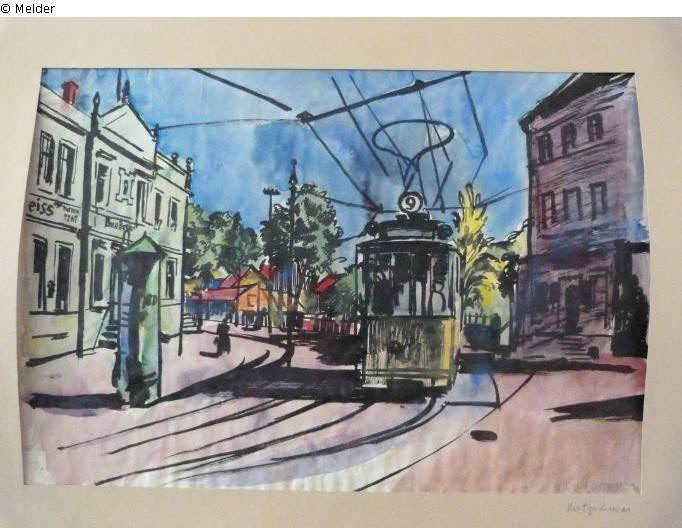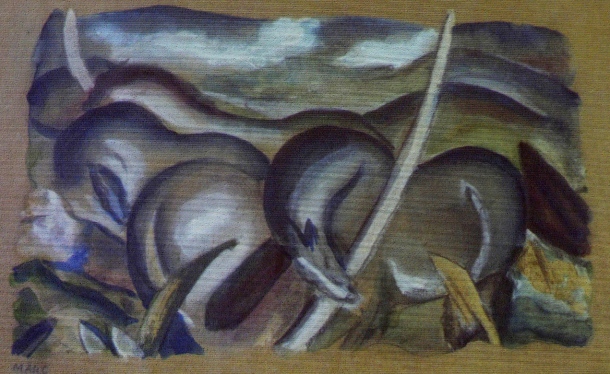The coordination office in Magdeburg continues to post details about works of art seized from Cornelius Gurlitt in Schwabing, with a total of 327 works now available for viewing. There has been almost no discussion yet, however, of what process the government will employ to allow claimants to make their case. Those in the United States have options discussed further below.
327 Gurlitt Collection Works Now Known; Time for Claims in the United States?
Topics: veschollene Kunst, Schwabinger Kunstfund Cornelius Gurlitt, Strafprozessordnung, Hildebrand Gurlitt, EBS Dispute Resolution Center, Munich Hoard, IFKUR, Verjährungsfrist, Peter Bert, Germany, Matthias Weller, prescriptive ownership, Nazi-looted art, Gurlitt Collection, Foreign Sovereign Immunities Act, Baden-Württemberg, Entartete Kunst, Nazis, Ingeborg Berggreen-Merkel, Munich, Schwabing, Magdeburg, FSIA, Dispute Resolution in Germany, Bavaria, Looted Art, Foreign Sovereign Immunities, deutches Recht, degenerate art, Altmann v. Republic of Austria, www.lostart.de, stop, Raubkunst, German Civil Code § 221, Sec. 108 German Code of Criminal Procedure, Kunstfund München, Münchner Kunstfund
Gurlitt Taskforce Announces Plan to Post 590 More Works. Choice of Law, Procedure, and Venue for Claims Up in the Air
Ingeborg Berggreen-Merkel, leader of the newly formed federal “Schwabing Art Find” taskforce, announced plans to release information about 590 additional works found in the apartment of Cornelius Gurlitt, after the posting earlier this week of 25 works at www.lostart.de. Meanwhile, the heirs of Max Ernst have publicly disclosed (through their attorney Jürgen Wilhelm in Cologne) their claim to certain of the works in the Gurlitt find. The federal authorities appear to be gaining the upper hand for disclosure against the tax investigators in Bavaria who initially seized the collection, which was not a foregone conclusion.
Topics: Cologne, veschollene Kunst, the Lion Tamer, Lempertz, Cornelius Gurlitt, Schwabinger Kunstfund. Kunstfund München, Max Liebermann, Köln, Gurlitt Collection, Foreign Sovereign Immunities Act, Hildebrand Gurlit, Entartete Kunst, Nazis, Ingeborg Berggreen-Merkel, Hermann Goring, Michael Hulton, FSIA, Gurlitt, Restitution, conversion, Looted Art, World War II, degenerate art, Altmann v. Republic of Austria, Löwenbändiger, Raubkunst, Alfred Flechteim, Jürgen Wilhelm, Max Ernst
Merkel Hints at Putting Gurlitt Lists Online, Calls for Special Tribunal Are Made
Catherine Hickley reports from Berlin that the government of Chancellor Angela Merkel is looking into ways to put lists and/or photographs online concerning the Cornelius Gurlitt seizure of roughly 1,400 paintings with connections to Nazi looting. This followed heavy complaints in the first days of the revelation, that the government had failed to identify what has been found. The biggest question remains why this remained a secret for roughly two years since the discovery. Merkel’s government claimed yesterday it learned of the find only in the last few months.
Topics: Stephanie Barron, Jeu de Paume, unbekannte Meisterwerke, Focus, Hildebrand Gurlitt, Theo Hermsen, S. Lane Faison, Linz Führermuseum, Munich Central Collecting Point, Wiesbaden Collecting Point, HARP, Max Liebermann, WWII, Monuments Men, Alt Aussee, Gurlitt Collection, Max Beckmann, Association for Research into Crimes Against Art, Monuments, Degenerate Art: The Fate of the Avant-Garde in Naz, Albrecht Dürer, Auktionshaus Lempertz, Entartete Kunst, Fine Arts and Archives Program, Nazis, Marc Chagall, Paul Klee, Entdeckung verschollener Kunst, beschlagnahmte Bilder, Holocaust Art Project, Judge Arthur Tompkins, Roberts Commission, Angela Merkel, Restitution, 1939 Galerie Fischer auction, World War II, degenerate art, Capt. Doubinsky, Los Angeles County Musuem of Art, Erben, Raubkunst-Bildern, Altmann v. Republic of Austria, Portrait of Wally, Löwenbändiger, Marc Masurovsky, Franz Marc, Oskar Kokoschka, Ernst Ludwig Kirchner, München, Pablo Picasso, ARCA, Lawyers' Committee for Cultural Heritage Preservat, Nazi Raubkunst, Henri Matisse, Emil Nolde
Paintings Targeted by the Nazis Found in Munich, Could be Biggest Discovery Since the War. What Now?
The German magazine Focus broke a story over the weekend that could be the biggest restitution news since Portrait of Wally or Altmann v. Republic of Austria: roughly 1,400 paintings were found in a Munich apartment that may have been seized, looted, or sold bought under duress by the Nazis in the 1930s as part of their drive to purge what they called “degenerate”—but extremely lucrative—art (the Focus coverage is extensive and excellent, though fair warning, in German). The paintings, which were apparently recovered not recently, but in 2011 as part of a customs seizure related to a currency declaration of all things, include works by Pablo Picasso, Henri Matisse, Marc Chagall, Emil Nolde, Franz Marc, Max Beckmann, Paul Klee, Oskar Kokoschka, Ernst Ludwig Kirchner, Max Liebermann and Albrecht Dürer, from collections traced back to Paul Rosenberg and others who had to abandon their property during the war, all long thought lost to the destruction of the war. They are valued in excess of 1 billion euros.
Topics: Stephanie Barron, unbekannte Meisterwerke, Focus, Hildebrand Gurlitt, S. Lane Faison, Linz Führermuseum, Max Liebermann, WWII, Monuments Men, Alt Aussee, Gurlitt Collection, Max Beckmann, Degenerate Art: The Fate of the Avant-Garde in Naz, Albrecht Dürer, Auktionshaus Lempertz, Entartete Kunst, Nazis, Marc Chagall, Paul Klee, Entdeckung verschollener Kunst, beschlagnahmte Bilder, Restitution, 1939 Galerie Fischer auction, World War II, degenerate art, Los Angeles County Musuem of Art, Erben, Raubkunst-Bildern, Altmann v. Republic of Austria, Portrait of Wally, Löwenbändiger, Franz Marc, Oskar Kokoschka, Ernst Ludwig Kirchner, München, Pablo Picasso, Lawyers' Committee for Cultural Heritage Preservat, Nazi Raubkunst, Henri Matisse, Emil Nolde
Combining the Nazi Theft Exception in Senate Bill 2212 with Immunity from Seizure: Good Policy or Inconsistent Law?
Opposition to Senate Bill 2212, the Foreign Cultural Exchange Jurisdictional Immunity Clarification Act (a bill the Art Law Report favors in its frequent commentaries) has been renewed recently. Senate Bill 2212 (already passed by the House of Representatives) would remove the mere display of a work of art in the United States as a satisfactory basis to satisfy the commercial activity requirement of the Foreign Sovereign Immunities Act necessary to sue a foreign sovereign here in the United States.
Topics: Germany, Foreign Sovereign Immunities Act, Plundered Art, 22 U.S.C. § 2459, Restitution, Senate Bill 2212, World War II, Foreign Sovereign Immunities, Nikki Georgopulos, Altmann v. Republic of Austria, Immunity from Seizure Act, Nazi theft, Foreign Cultural Exchange Jurisdictional Immunity, Malevich v. City of Amsterdam, Art Law Report




